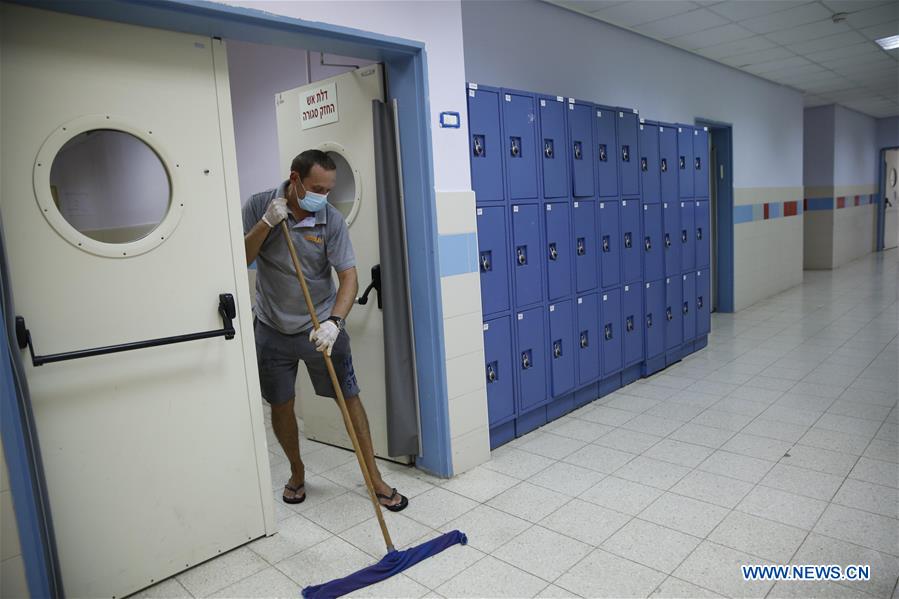
A cleaner wipes the floor at a high school in the central Israeli city of Modiin on Aug. 31, 2020. Over 2 million Israeli students will return to schools on Tuesday under the shadow of the COVID-19 pandemic. The education ministry has come up with stringent guidelines on how the school year should be conducted. (Photo by Gil Cohen Magen/Xinhua)
by Keren Setton
JERUSALEM, Aug. 31 (Xinhua) -- Over 2 million Israeli students will return to schools on Tuesday under the shadow of the COVID-19 pandemic.
The education ministry has come up with stringent guidelines on how the school year should be conducted. While younger children have been divided into smaller groups and will attend school between five to dix days a week, the older students will conduct most of their studies at home.
Through a campaign called "studying safely," the ministry has explained the guidelines to parents and students through varying media. Children of the fourth grade and above will be obligated to wear a mask at all times.
Hours before the school gates are to open, there is still a discussion in the government on whether to open schools in areas with a high infection rate.
Israel has one of the highest proportion of young students in the world, but expenditure on education is not high, which leads to crowded classrooms. Coupled with a significant shortage in teachers, the problem is intensified when COVID-19 requires social distancing and other measures that are difficult to implement.
When the Israeli government imposed strict lockdown measures in March, schools were shut down. As measures were lifted, children returned to schools in mid-May. In the beginning, only the younger students returned and studied in small groups. As virus levels plummeted and public pressure mounted, all the children went back to school with virtually no restrictions.
It was only a few weeks before the pandemic resurgence appeared in the country.
The virus has led to the deaths of over 900 Israelis, with more than 110,000 others infected with the disease.
While the number of students who contracted the virus is relatively low, there is still concern that with confirmed cases increasing, opening schools will only further worsen the situation.
The pressure to resume the system remains the same as what happened in May. With a deteriorating economy, parents need their kids back to school so that they can return to work.
"We all just want to get back to our routines," said Efrat Leon, a science teacher from the southern Israeli town of Ashkelon. "I hope that the new regulations will guarantee that there will be no major outbreak of the virus because of the opening of the school year."
She said it's almost impossible to make children maintain social distancing, "we are definitely taking a risk here."
But also, many experts say schools must remain open for the general health of children who suffer greatly when schools are shut down.
"Opening schools is very important socially and critical to children's development, despite it being a major challenge," said Nadav Davidovitch, director of the School of Public Health at Ben Gurion University of the Negev.
"I am concerned that they already have gaps in their studies and socially, they will also have problems after being apart from their friends for so long," said Revital Amitai Hazan, a mother of two from Jerusalem.
For children in kindergartens and of the first grade, their first day at school will be challenging under restrictions.
"When other gatherings are allowed, when malls and markets are open, we are not allowed to accompany our kids," said Sharon Dagon Calderon, a mother of three from a Jerusalem suburb.
The government has been facing criticism for inconsistent policies which have been changed frequently. For weeks, the education ministry has been working on a framework for schools and still, just days before the first bell rings, there are matters which have not been resolved.
"There is a serious problem of last-minute decision making and lack of structure," said Leon.
Moreover, unbalanced funds and teaching resources in different areas will further increase the gaps that already exist in the country. Related organizations have threatened to strike due to the inequalities. Enditem



